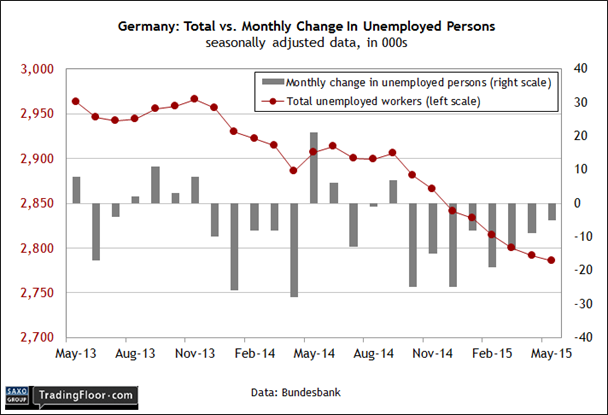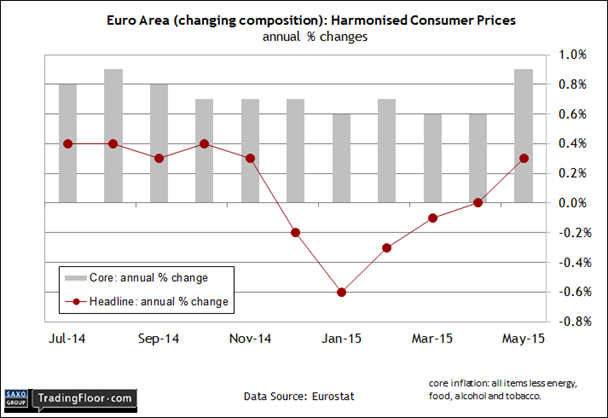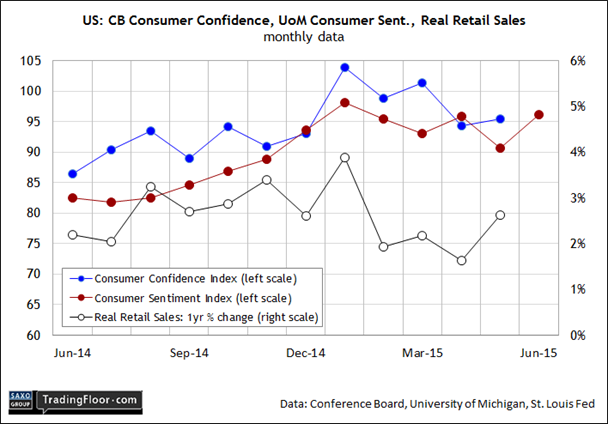It’s still Greece, Greece, Greece in the headlines, but Tuesday’s a busy day for scheduled economic releases throughout Europe and the US. The highlights include this month’s first look at unemployment in Germany, June's flash estimate for consumer price inflation in the Eurozone, and the Conference Board’s monthly update of US consumer confidence.
Germany: Unemployment Report (07:55 GMT): Greece is roiling confidence in the euro area and beyond, but if the crisis that's emanating from the Eurozone’s south-eastern tip threatens widespread trouble it’s yet not obvious in Germany’s labour market. That doesn’t mean that there’s no serious macro dangers lurking – quite the contrary, in fact, depending on what happens in the days ahead. But for the moment, Europe’s centre of economic gravity remains steadfast.
Earlier this month, the government reported that unemployment fell to a 24-year low in May. “Although GDP growth has cooled somewhat of late, developments on the labour market have continued to be positive,” said the president of Germany’s Federal Employment Agency.
Today’s update for June isn’t expected to reveal much of a change from the previous round of upbeat news. Nonetheless, it’s possible to see some cracks in the generally positive trend. In particular, keep an eye on the monthly change in the number of unemployed persons. This key metric has been sending mostly bullish signals in recent history.
The jobless population has declined for eleven straight months through May. But as the chart below reminds, the slide is decelerating, with a relatively thin fall of only 5,000 in May (seasonally adjusted), the smallest drop since last August.
That’s hardly a tragedy, but it’s a reminder that Germany’s rebound after the global financial crisis and recession of 2008-09 is no spring chicken. Yes, it’s all part of the natural evolution of the business cycle and in some respects there’s nothing unusual or worrisome here. But given the extraordinary events in Greece at the moment, even a whiff of lesser growth for Europe’s biggest economy will resonate – particularly if today’s numbers are unusually weak.
Last week’s news that consumer confidence is in retreat is another reminder that the potential for trouble can’t be ignored. “The previously unsuccessful attempts to find a solution to the debt crisis in Greece as well as the country's impending default now appear to be dampening German consumers' economic outlook,” Gfk noted in the monthly update of its survey data.
It’s probably just a temporary setback, although today’s labour market release will provide fresh context for deciding if there’s more blowback to come.

Eurozone: Consumer Price Inflation (09:00 GMT): Recent data for the Eurozone paints an encouraging if still modest recovery trend. The upbeat figures include the rebound in inflation. The headline year-over-year comparison is especially stark of late in showing that the trend in prices has pulled back from a brief flirtation with deflation.
Does the escalating Greek crisis threaten the progress to date? Probably not, at least not beyond the immediate future. But any optimism that the currency bloc will survive with or without Greece is subject to daily if not hourly revisions these days. That includes today’s flash estimate of inflation for June.
There’s a good case for anticipating that we’ll see some slowing in pricing pressure. Yesterday’s numbers for this month’s estimate of German inflation suggest as much: consumer prices were weaker than expected, easing to a 0.3% year-over-year rise – well below the 0.7% increase in May.
The surprisingly hefty degree of deceleration suggests that something similar may show up in today’s Eurozone data. "June's sharp fall in German HICP inflation confirmed that underlying price pressures have remained very subdued even in the Eurozone's strongest economy," noted an analyst at Capital Economics yesterday. "While weakness in Germany will be partly offset by the rise in Spanish inflation ... we now see Eurozone inflation falling to about zero in June," Jennifer McKeown told Reuters on Monday.

US: Consumer Confidence (14:00 GMT): Greece has cast a pall over global markets, but the case is still intact for thinking that the US will continue to post moderately stronger numbers after a weak first quarter. The Atlanta Fed’s GDPNow model currently anticipates a 2.1% growth rate in Q2 in quarterly terms (as of June 25), or more than double the pace relative to the estimate at the start of this month.
No trivial influence on the latest revision for the GDP outlook is last week’s news that US consumer spending in May increased the most in nearly six years. "We are finally seeing signs of consumers beginning to spend the gasoline savings they have been sitting on since the start of this year," said the chief US Economist at Capital Economics. “Moreover, spending is also being driven by a rapidly improving labor market.”
Not surprisingly, the mood on Main Street is brightening, or so it appears based on the initial June survey data for the University of Michigan’s consumer sentiment index (red line in chart below). The rise suggests that today’s update of consumer confidence from the Conference Board will follow suit.
Economists expect no less. Econoday.com’s consensus forecast sees the consumer confidence index inching up to 97.4 for the June reading. If so, the increase will strengthen the case for anticipating that the upbeat numbers on US consumption in May will continue in June.

Disclosure: Originally published at Saxo Bank TradingFloor.com
